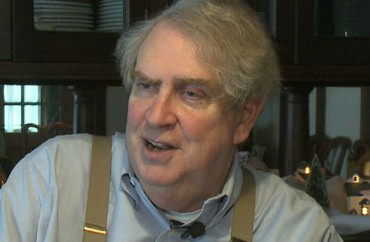
UPDATED
One ‘extramural’ comment does not demonstrate his ‘unfitness’ for the job
“The only dispute before us is the proper interpretation of a contract.”
And that contract was clear: Not even a private university can punish a professor for using the academic freedom guaranteed by his tenure, willingly granted by his university.
The Wisconsin Supreme Court Friday reversed a lower court that granted deference to Marquette University’s interpretation of its contract with John McAdams (above), a political science professor who has been suspended indefinitely without pay for more than two years.
McAdams used his blog to publicly criticize a graduate teaching instructor who forbade an unnamed student from openly disagreeing with same-sex marriage in her class.
Cheryl Abbate had told her class that “everyone agrees on” the rightness of same-sex marriage – even at the Catholic university – so there was no need to discuss it in the context of philosopher John Rawls’ Equal Liberty Principle, according to the student.
President Michael Lovell went beyond the two-term suspension recommended by the Faculty Hearing Committee for McAdams’ behavior toward Abbate.
He required McAdams to write a letter apologizing for his blog post as “reckless and incompatible” with Marquette values, and expressing “deep regret” for the harsh criticism Abbate had received from others because McAdams named her. McAdams refused and sued.
The university took the unusual step of buying ads on Google to denounce McAdams ahead of this spring’s oral argument at the state supreme court, which approved McAdams’ request to bypass an intermediate appellate court when he lost at a lower court.
Faculty committee ‘infected’ with ‘unacceptable bias’
The high court ordered Marquette to reinstate McAdams “with unimpaired rank, tenure, compensation, and benefits,” as well as back pay, as laid out in its faculty statutes in Friday’s 120-page ruling.
It began by rebuking the Milwaukee County Circuit Court for agreeing with the university that McAdams couldn’t challenge his indefinite suspension in court.
The university could have made him sign an arbitration clause as a condition of employment but did not, Justice Daniel Kelly wrote in the majority opinion: “Our exhaustive review of the Faculty Statutes reveals no indication that the University and Dr. McAdams agreed the Discipline Procedure would supplant the courts or limit their review of a contractual dispute.”
Two of those statutes explicitly give McAdams the “right to seek judicial adjudication of his claims,” one phrased “negatively” (preventing litigation before a certain point) and the other a “positively-stated recognition” that “the University’s suspension and dismissal decisions are subject to litigation in our courts.”
The majority said the Faculty Hearing Committee was “infected” with “unacceptable bias” against McAdams, agreeing with the professor’s protest that a committee member had publicly prejudged him before the hearing in an open letter.
The faculty statutes give no threshold for “disqualifying bias” in a proceeding, and American Arbitration Association rules would have disqualified Lynn Turner if they had been followed, the majority said:
She publicly inserted herself into the dispute and expressed a personal interest in its outcome. And she did not just express her opinions on these matters in passing——she committed herself to them in writing. Having done so, she could not decide the FHC proceedings in favor of Dr. McAdams without contradicting what she had already said to the entire Marquette University campus.
The courts also cannot defer to the Faculty Hearing Committee’s decision because it is not truly binding but simply “advice” to the president – who has “unfettered discretion” – and hence not analogous to a binding arbitration, the opinion said:
It was President Lovell, not the FHC, who decided whether Dr. McAdams would be disciplined. … It was President Lovell who actually meted out the discipline when he sent Dr. McAdams the Discipline Letter. And it was President Lovell who created the conditions on reinstatement that have kept Dr. McAdams in suspension limbo.
The court has also recently stopped granting deference to administrative agencies’s “conclusions of law” in a separate case, finding the practice “unsound in principle,” so it won’t apply deference to this similar scenario under outdated case law.
No notice of what ‘academic freedom’ protects
Judging the university by its own definition of “academic freedom,” taken from a 1940 statement of the American Association of University Professors, the court majority found the university violated McAdams’ university-granted freedom.
The “special obligations” on professors engaged in “extramural speech” such as blogging, mentioned in the AAUP statement, are not generally understood as “binding obligations” of the sort that can be used to discipline a professor, the court said.
Marquette misstated the “analytical structure” of deciding whether McAdams’ blog post lost its protection under academic freedom, Justice Kelly wrote.
It was supposed to first judge whether the post itself suggested his “unfitness” as a professor, and if so, then consider “the broader context of the faculty member’s complete record.” Marquette instead judged the post in light of McAdams’ entire record, removing the “stringent standard of proof for dismissal” under AAUP rules.
And the university gave faculty no notice of what academic freedom actually protects by saying it’s balanced against other “core” values of Marquette, Kelly wrote: “The extramural comment is not supposed to be a key to other materials the University may wish to place in the ‘unfitness’ balance.”
The university’s view of academic freedom is nothing more than a “subjective, post-hoc analysis of what the institution might find unacceptable after watching how events unfolded” – in this case, the hate mail that Abbate received after McAdams named her. It ran its academic-freedom analysis in reverse:
And this would likely chill extramural comments to the point of extinction. It would be a fearless professor indeed who would risk such a comment, knowing that it licenses the University to scrutinize his entire career and assay it against the care of “all aspects of the lives of the members of the institution.”
Neither the Faculty Hearing Committee nor the university could point to any rule or law that McAdams violated by naming Abbate and linking to her webpage, which included her contact information, the majority said. It also had no evidence that McAdams “instigated” the unnamed student’s recording of his discussion with Abbate after class, or even that a student-initiated recording violates any rule.
Notably, the university had to again “reverse-engineer” its analysis of McAdams’ post, using “third-party responses to the blog post as a proxy for its allegedly contempt-inducing nature,” Kelly’s opinion concludes: The post “makes no ad hominem attack on Instructor Abbate, nor does it invite readers to be uncivil to her, either explicitly or implicitly.”
Because McAdams was punished solely for the blog post, which is a “contractually-disqualified basis for discipline,” Marquette exceeded authority under its own rules to use its “discretionary cause” against the professor, the majority said.
School’s own ‘academic freedom’ can’t erase ‘legally enforceable’ contract
Responding to the dissent by justices Ann Walsh Bradley and Shirley Abrahamson, which said the majority ignored Marquette’s own academic freedom as a private Catholic university, the majority went back to Marquette’s contract with McAdams.
“A university’s academic freedom is a shield against governmental interference; the dissent, however, would reforge it as a sword with which to strike down contracts it no longer wishes to honor,” Justice Kelly wrote:
When the decision to hire is complete, the relationship is no longer a simple matter of academic compatibility. The employment contract adds a legally enforceable aspect to the relationship. …
The outward-facing protection against governmental interference [under the dissent’s view] would turn inward, pitting the institution’s academic freedom against the faculty’s academic freedom. The result would be a never-ending pitched battle in which each side tries to expand its own sphere of academic freedom at the expense of the other [and thus erode shared governance].
President Lovell was wrong to require McAdams to write a groveling letter apologizing for his blog post as a condition of returning, the majority said. The university can’t enforce any of Lovell’s “reinstatement conditions” on McAdams.
The case is going back to the lower court that ruled against McAdams to enter judgment in his favor and determine how much back pay he is owed.
Can’t ‘work backwards to find a justification for firing them’
The ruling drew cheers from academic freedom groups.
The Foundation for Individual Rights in Education, one of many groups to file friend-of-the-court briefs siding with McAdams, said the ruling confirmed that university officials “cannot simply decide that they do not like the results of certain faculty speech, and then work backwards to find a justification for firing them.”
John Banzhaf, a law professor at George Washington University, wrote in an email blast that “professional standards of conduct” are too vague to be enforceable, but are rather used as an “all purpose tool for disciplining both faculty and students.”
The American Association of University Professors’ official blog Academe noted that the court majority used the group’s “approach to extramural comments.” It had also sided with McAdams in a friend-of-the-court brief.
McAdams’ lawyers at the Wisconsin Institute for Law and Liberty said the ruling affirmed that McAdams can “teach students without having to compromise his principles,” which was “the only thing” he wanted to do. “[T]his is a major day for freedom.”
Marquette continued to protest the notion that it violated McAdams’ academic freedom in a response to the ruling.
It once more sought legal refuge in its private Catholic identity, suggesting the state’s high court had no authority to interpret an employment contract.
The university ignored the court’s analysis of McAdams’ blog post, insisting that he chose to “mock” Abbate and “intentionally” expose her to a “hostile audience” who sent her “vile and threatening messages,” which led to Abbate’s exit from Marquette.
Marquette claimed it would have left McAdams alone had he excluded Abbate’s name and “contact information” from the blog. McAdams did not publish Abbate’s contact information but simply linked to her public webpage, where she voluntarily included her contact information.
It claimed other universities may be harmed by the ruling because the high court faulted a “contractually established disciplinary process” that governs “when a professor crosses the line.”
The university suggested it would punish professors who took similar action as McAdams, regardless of the court ruling: “Unfortunately, Marquette can’t undo the significant harm that he caused to the former student teacher’s academic career. We must, however, ensure that this doesn’t happen to another student.”
Marquette implied it would revise its policies to circumvent the ruling, perhaps inserting an employment clause that forbids professors from going to court: “However, in light of today’s decision, Marquette will work with its faculty to re-examine its policies, with the goal of providing every assurance possible that this never happens again.”
UPDATE: Marquette’s response to the ruling has been added.
IMAGE: Fox 6 Now screenshot
Like The College Fix on Facebook / Follow us on Twitter






Please join the conversation about our stories on Facebook, Twitter, Instagram, Reddit, MeWe, Rumble, Gab, Minds and Gettr.